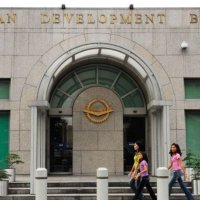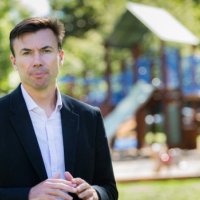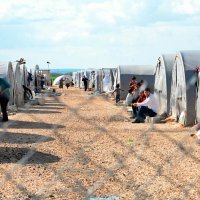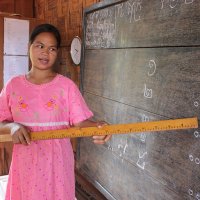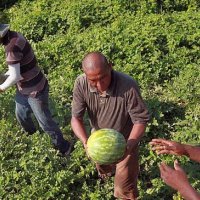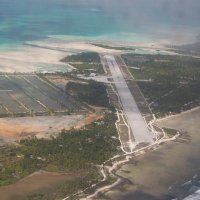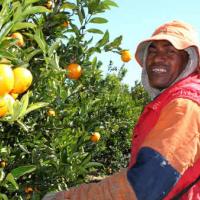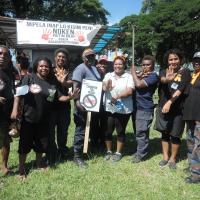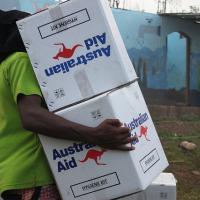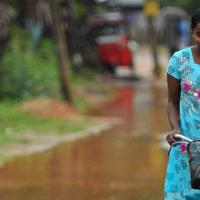- Home
- About
- People
- Publications
- Podcasts
- Asia & the Pacific Policy Studies
- Events
- Annual Australasian AID Conference
- The Mitchell Orations
- PNG Update
- Pacific Update
- Australian aid
- PNG Project
- Pacific Research Program
- Pacific migration
- PNG and Pacific scholars
- Global development policy
- Support us
- Contact us
- Drupal
Past events
Economic diversification and tax reform in Papua New Guinea
12.30–1.30pm 8 December 2016
Sir Nagora Bogan, Chancellor of Papua New Guinea’s University of Technology (Unitech).
The independent Tax Review Committee (TRC) established by the Government of PNG recently completed a comprehensive review of the country’s tax system involving extensive and transparent stakeholder consultation over the course of two years. This culminated in two volumes of reports (inclusive of significant economic and tax reform recommendations) which were formally presented to the PNG Government in November, 2015.
The final report highlighted the high risks of PNG’s overdependence on the extractive sector and its vulnerability to the cyclical vagaries of global commodities pricing and recommended a ‘paradigm shift’ in the governance, management and stimulation of sustainable economic development. PNG’s vulnerability has become pronounced in recent months with the sudden drop in the oil price resulting in fiscal distress, lack of foreign exchange, and economic slowdown.
PNG is at a precarious crossroads and tax reform provides an opportunity for a strategic transformation. The report provides some realistic and practical policy, legal, institutional, and structural reforms to mitigate economic risk and vulnerability by diversifying the economic base to more sustainable sectors like agriculture, forestry, fisheries and tourism.
Sir Nagora Bogan, KBE, is Chancellor of the University of Technology, Chairman of the Papua New Guinea Tax panel of experts. He began his career with the PNG Taxation Office and during the 1980s and 1990s took a leading role in modernising tax administration in PNG. From 1991-1995, he was non-salaried Chairman of the London-based Commonwealth Association of Tax Administrators and from 1996 to 2002 Papua New Guinea’s Ambassador to the United States of America with concurrent accreditation as Ambassador to Mexico and High Commissioner to Canada. He served as Chairman of the Nambawan Super Fund Limited for more than a decade and is a director or board member of a number of PNG and regional corporations.
The seminar was presented as part of the Development Policy Centre’s PNG Project, which receives funding from the Australian Aid Program through the Pacific Governance and Leadership Precinct.
» read more
The future of the World Bank
12.30–1.30pm 7 November 2016
Mr Kyle Peters, Interim Managing Director and Chief Operating Officer and Senior Vice President, Operations, The World Bank.
The global community is facing extraordinary challenges which call for a new approach to ensuring the poorest and most vulnerable are protected. At the same time, the international community has significantly raised and accelerated its ambitions to achieve the Sustainable Development Goals, fight climate change, and better manage collective risks.
To address these global challenges and meet heightened ambitions, the World Bank is innovating to respond, including a package to double financial support to the most in-need countries facing fragility, conflict and violence. Development partners including Australia form an integral part of this strategy.
As part of his inaugural visit to Australia, World Bank Interim Managing Director and Chief Operating Officer and Senior Vice President, Operations, Kyle Peters shared insights on current global development issues, and the future direction the World Bank is taking to address them.
Kyle Peters is the World Bank’s Interim Managing Director and Chief Operating Officer and Senior Vice President, Operations.
Kyle is responsible for global operations in support of the World Bank’s twin goals of ending poverty and promoting shared prosperity, and the strategic direction and policy framework of the International Development Association – one of the largest sources of assistance for the world’s 77 poorest countries.
Kyle’s top priorities include delivery of the World Bank’s lending and knowledge program to client countries; driving improvements in the World Bank delivery model; and oversight of planning and strategy to ensure the World Bank is effectively delivering on development goals.
» read more
Strengthening public financial management reform in Pacific Island countries
1–2.30pm 31 October 2016
Richard Bontjer, Lead Public Financial Management Specialist, Department of Foreign Affairs and Trade; Professor Peter Annear, Head of the Health Systems Governance and Financing Unit, Nossal Institute for Global Health, University of Melbourne; Susan Ivatts, Senior Health Specialist, World Bank; Tobias Haque, Economist, World Bank and Dr Julien Barbara, Fellow, State, Society & Governance in Melanesia Program (SSGM), ANU.
The World Bank, Department of Foreign Affairs and Trade (DFAT), New Zealand Ministry of Foreign Affairs and Trade (MFAT), and Overseas Development Institute (ODI) have recently released a report that makes the case for adopting a problem-driven approach to public financial management reform in Pacific Island countries. The report, which includes the results of detailed case studies of reform experience in Kiribati and Tonga, examines how well reform programs have focused on the key challenges that Pacific Island countries face in managing fiscal policy and financing delivery of public services.
On October 31, one of the authors of the report, Richard Bontjer from DFAT, presented its key findings, and a panel of experts from the World Bank, DFAT, and the Nossal Institute for Global Health discussed the implications of the report’s recommendations for delivery of health services in the Pacific.
» read more
ADB@50: what does the future hold?
10–11.30am 26 October 2016
Professor Ron Duncan, ANU; Mr Stephen Groff, Vice President, Asian Development Bank; Professor Hal Hill, ANU; Ms Annmaree O’Keeffe AM, Lowy Institute and Dr Matthew Dornan, Deputy Director, Development Policy Centre, ANU.
The Asian Development Bank (ADB) commenced operations on 19 December 1966. Over the subsequent 50 years, the ADB has partnered its Asia-Pacific developing member countries on a remarkable journey of transformation and poverty reduction.
To help mark ADB’s half-century, a panel of eminent speakers shared their insights on Asia-Pacific development over the past 50 years, canvassed the future of the ADB, and discussed Australia’s partnership with the Bank.
How important has the ADB been to the development successes of the region? What have been its achievements and shortcomings? What are the main challenges facing the Asia-Pacific today? Is the ADB still relevant to the region, and how should its role evolve? How important is the ADB to Australia, and what should Australia expect from it?
Professor Ron Duncan is a former Director of Crawford School of Public Policy, and an eminent scholar of the Pacific and Asian economies. Stephen Groff is Vice President of the ADB and is responsible for the full range of ADB’s operations in East Asia, Southeast Asia, and the Pacific. Professor Hal Hill is the H W Arndt Professor Emeritus at Crawford School of Public Policy, and a foremost authority on the economies of Southeast Asia. Ms Annmaree O’Keefe is a Nonresident Fellow at the Lowy Institute for International Policy, and is currently co-authoring a Lowy report on the role and relevance of ADB in the 21st Century. Dr Matthew Dornan, Deputy Director of the Development Policy Centre chaired the panel.
» read more
State of the PNG public sector
1–2pm 21 October 2016
John Ma’o Kali, CMG, OBE, Secretary, Department of Personnel Management, Papua New Guinea Government.
The Papua New Guinea’s Department of Personnel Management plays a critical role as a central agency in the Government’s policy initiatives and implementation of the Public Sector Reforms.
In this public seminar, Mr John Ma’o Kali, Secretary of Papua New Guinea’s Department of Personnel Management, examined the size and shape of the PNG’s public service, the successes and challenges of the PNG’s public sector, and identify the areas of priority and reform in public sector management.
Mr Kali also discussed the Pacific Leadership and Governance Precinct, a new initiative between the governments of Papua New Guinea and Australia that aims to strengthen leadership, governance and public sector capacity in PNG.
This seminar was presented as part of the Development Policy Centre’s PNG Project, with funding from the Australian Aid Program through the Pacific Governance and Leadership Precinct.
» read more
The Nauru Dilemma
12.30–1.30pm 17 October 2016
Paul Ronalds, Chief Executive Officer, Save the Children Australia.
When asked by then Immigration Minister Tony Burke to provide services to asylum seeker children on Nauru in 2013, Save the Children was faced with a clear dilemma. The Government’s policy was a clear breach of international law, including the Convention on the Rights of the Child. If Save the Children provided services, there was a risk that it may be considered complicit in that breach. On the other hand, Save the Children had significant experience working with refugees and asylum seekers in camps around the world and was confident it could mitigate some of the immediate humanitarian need and have a positive influence on the conditions on Nauru. From August 2013 to October 2015, Save the Children was contracted by the Australian Government to provide welfare, education and recreation services to asylum seekers in Nauru. Paul Ronalds, CEO of Save the Children, discussed how Save the Children sought to negotiate the dilemmas it faced to ensure it was always acting ‘in the best interests of children’.
Paul Ronalds is the Chief Executive Officer (CEO) of Save the Children Australia. He is also currently a non-executive director of the Centre For Social Impact, the Campbell Collaboration and the Community Council of Australia. Prior to joining Save the Children, Paul was First Assistant Secretary responsible for the Office of Work and Family in the Department of Prime Minister and Cabinet. Paul has also worked as Deputy CEO of World Vision and as chief operating officer of Urban Seed, an innovative and dynamic NGO that provides a range of services to marginalised people in Melbourne’s inner city. He started his career as a corporate lawyer with international law firm Herbert Smith Freehills before co-founding wishlist.com.au. Paul is a graduate of the St James Ethics Centre’s Vincent Fairfax Fellowship in Ethics and Leadership and has degrees in economics and law with honours from Monash University, a graduate diploma in applied finance and a masters in international relations from Deakin University. He is the author of The Change Imperative: Creating a Next Generation NGO, a book that examines the organisational challenges faced by international NGOs in a rapidly evolving global political context.
» read more
Engaging diasporas in humanitarian response and economic development
1–2pm 29 September 2016
Chukwu-Emeka Chikezie, MBE, Director, Up!-Africa Limited; and Finau Heuifanga Limuloa, International Federation of Red Cross and Red Crescent Societies Pacific Office, Suva.
Migrant-and refugee-led organisations implement innovative, small-scale, low-cost projects that are potentially replicable and scalable. Because of their close connections, these multicultural communities have high levels of contextual knowledge and access to vulnerable populations. However, policymakers have only just begun to appreciate the powerful role that migrant-and refugee-led organisations might play in Australian development efforts.
In this public seminar following on from the inaugural Disaporas in Action Conference in Melbourne, Chukwu-Emeka Chikezie MBE drew on his 30 years of experience in advancing diaspora engagement with government, NGOs and the private sector in the UK to identify possible ways forward for collaboration with diasporas in Australia. Finau Limuloa reflected on how Australia’s contributions to development and humanitarian response in the Pacific might be enhanced by leveraging the unique strengths, knowledge and people-to-people connections of diasporas.
» read more
The intractable problem of landowner identification in the PNG LNG project: a historical perspective
12.30–1.30pm 8 September 2016
Associate Professor Colin Filer, Resources, Environment and Development Group, Crawford School, ANU.
In the second week of August this year, Papua New Guinea’s national newspapers reported that the customary landowners of the Hides gas field, the primary source of raw material for PNG’s Liquified Natural Gas project, were protesting and threatening to ‘turn off the taps’. This was because they had still not not received significant amounts of the money that was owing to them under a series of development agreements negotiated in 2009, despite the fact that the project has already been operational for two years. Government spokesmen sought to assure the landowner representatives that the money was safely accumulating in a government trust account pending the results of what was described as an ‘outstanding [meaning unfinished] landowner identification process’. While some observers would treat this as a simple case of policy failure on the part of the national government, Dr Filer argues that it is the outcome of a protracted contest between three distinct visions of what the Oil and Gas Act 1998 calls ‘social mapping and landowner identification’. These three visions or ideologies, Idealism, Pragmatism, and Individualism, constitute the three corners of a policy domain and a policy contest that has now lasted for more than 25 years.
Colin Filer is an Associate Professor in the Resources, Environment and Development Group, and an Associate of the Development Policy Centre, in Crawford School of Public Policy. Before joining The Australian National University in 2000, he lived and worked in PNG for a period of 18 years, and during that period, he played an active role in drafting the ‘social mapping and landowner identification’ provisions of PNG’s Oil and Gas Act. He has also played many other roles as an expert on ‘landowner issues’ in PNG’s mining and petroleum sectors.
This event is co-hosted by Resources, Environment and Development Group of the Crawford School of Public Policy.
» read more
ODE aid evaluations: investing in teachers and learning from evaluations
9.30am–1pm 2 September 2016
Staff from the Department of Foreign Affairs and Trade, and Development Policy Centre, Crawford School, ANU.
The Office of Development Effectiveness (ODE) is an operationally independent unit within the Department of Foreign Affairs and Trade (DFAT) that measures and reports on the effectiveness of the Australian aid program.
This forum, which was jointly organised by the Development Policy Centre and ODE, is the latest in a series with the aim of profiling and discussing ODE evaluations and reports.
This event focused on ODE’s recent report on teacher training and its latest review of operational evaluations.
Investing in Teachers analysed DFAT’s experience with and identifies lessons for improving teacher development policies and programs. Review of Operational Evaluations Completed in 2014 examines the quality of 35 DFAT aid evaluations.
ODE staff presented the reports, DFAT staff responded, and speakers from the Development Policy Centre offered an independent perspective.
Further information about the Development Policy Centre: devpolicy.anu.edu.au
» read more
Pacific possible: labour mobility
12.30–1.30pm 3 August 2016
Stephen Howes, Director, Development Policy Centre, Crawford School, ANU; and Jesse Doyle, Social Protection Economist, World Bank
Labour mobility is increasingly recognised as critical for the Pacific island region. But opportunities to migrate are unevenly distributed across the Pacific, which includes both some of the most integrated and some of the most isolated countries in the world.
What could be possible by 2040 if the potential of labour mobility were to be fully realised? What actions can sending and receiving countries take to make this a reality? The new joint ANU-World Bank report Pacific Possible: Labour Mobility answers these questions. It sets out pathways to expand Pacific labour mobility, detailing policy options and requirements for both sending and receiving countries. And it quantifies the massive gains that these reforms would bring about for sending countries.
This report is written by Richard Curtain, Matthew Dornan and Stephen Howes of the Development Policy Centre, and Jesse Doyle of the World Bank. This report is part of the Pacific Possible series – researching long-term, transformative opportunities for the economic development of Pacific Island countries.
» read more
The difficulties of supporting reform in fragile states: the case of water sector reform in Lebanon
12.30–1.30pm 27 July 2016
Rim El Kadi, Research Associate, Development Policy Centre, Crawford School, ANU.
This seminar discussed some of the compounded challenges of implementing a donor driven reform and water resources management in Lebanon, a paradigmatic fragile, politically and socially divided, aid dependent country. Despite a major water sector reform started over a decade ago, and substantial donor pressure to promote it, water resources management remains a core sustainable development challenge for Lebanon. The conditional, generic, and prescriptive approach of the donors in driving the reform was confronted with a fragmented socio-political landscape and weak instructions. This resulted in an ambiguous formulation of the reform, a slow and uncertain implementation, further loss of institutional coherence, and at best no improvement in social, environmental or economic sustainability. The talk shed some light on the various stages of this reform and what lessons may inform future aid initiatives in Lebanon and other fragmented post-war states such as Iraq or Syria.
Rim El Kadi is currently Assistant Registrar-Student Systems at The Australian National University and a Research Associate at the Development Policy Centre. Rim El Kadi’s research interests include public sector management and reform in developing countries, sustainable development, and aid. Her PhD research covered the water sector reform in Lebanon, with a particular focus on the role of aid and development agencies in promoting reform and sustainable development, in the context of a weak state and a fragmented social fabric.
» read more
Financing responses to climate change in the Pacific
12–2pm 25 July 2016
Jonathan Pickering, Postdoctoral Research Fellow, University of Canberra; Carola Betzold, Visiting Research Fellow, Development Policy Centre, Crawford School, ANU; Ian Fry, Ambassador for Climate Change and Environment for the Government of Tuvalu; George Carter, PhD Candidate, State Society and Governance in Melanesia Program, ANU.
Climate finance and in particular adaptation finance has never been higher on the climate change agenda. The Paris Agreement in December 2015 confirmed the goal of providing US$100 billion each year by 2020 for climate action in developing countries, with balanced allocation between adaptation and mitigation, and agreed to set a new, longer-term collective goal by 2025.
Adaptation finance is of particular relevance for Pacific island countries, which are among the states in the world most vulnerable to climate change. Australia is one of the main providers of assistance for climate change adaptation in the region. Other forms of finance in response to climate change impacts are also increasingly advocated, including finance for loss and damage. The regional strategy for climate change and disaster resilient development is still to be finalised.
This panel brought together experts on international climate change policy and climate finance in the Pacific. Presenters discussed the extent and nature of climate financing in the Pacific, its governance, and Australia’s contribution.
This panel was co-hosted by the ANU Development Policy Centre and the University of Canberra’s Centre for Deliberative Democracy and Global Governance.
» read more
Going beyond ‘politics matters’ in international development
12.30–1.30pm 6 July 2016
Samuel Hickey, Research Director, Effective States and Inclusive Development (ESID) Research Centre, and Professor of Politics and Development, Global Development Institute, University of Manchester.
That politics has a defining influence over development prospects is now broadly accepted amongst leading development theorists and agencies alike. However, there is less agreement over which forms of politics matter most, how these can be conceptualised and what kinds of policy implications flow from thinking politically about development. This seminar addressed these questions by presenting the key findings of a five-year comparative investigation into the politics of development in Africa and Asia. Employing a version of the ‘political settlements’ framework that has gained popularity amongst development agencies of late, this work examined how power and politics shape inclusive development in a range of policy domains, including economic growth, natural resource governance, social provisioning and women’s empowerment.
In conceptual terms, the analysis emphasises the interplay between political settlements and the politics of specific policy domains, the power of ideas as well as incentives, and of the need to reposition political settlements analysis as a mid-range theory that can usefully explain particular puzzles of development rather than development itself. Policy-wise, the findings suggest the importance of ensuring that policy reform efforts are carefully attuned to the incentives and ideas that flow from different kinds of political settlement, and that normative efforts to promote ‘inclusive’ and ‘accountable’ institutions need to be rebalanced by a stronger focus on building state capacity, particularly through bureaucratic pockets of effectiveness. Although much of this work echoes calls to move beyond the good governance agenda in favour of ‘thinking politically and working differently’, it also draw attention to the perils of aligning development interventions too closely with existing forms of power and politics.
Listen to podcast here.
View presentation here.
» read more
Towards an integrated labour migration strategy in our Pacific neighbourhood
5.30–6.30pm 2 June 2016
Richard Bedford, Emeritus Professor, University of Waikato and President of the Royal Society of New Zealand.
Between 2007 and 2010 the late Graeme Hugo and Dr Richard Bedford met several times with the Australia New Zealand Immigration Forum, an annual meeting of senior officials from the Department of Immigration and Citizenship and the Department of Labour (NZ), to discuss population movement in the Pacific. An outcome of this interaction was a report entitled Population movement in the Pacific: a perspective on future prospects in which it was argued that greater convergence of policy relating to labour migration of Pacific peoples could make a significant contribution to development in the region. Four years later, after protracted negotiations over the Parliament and Civic Education Rebate plus trade and associated mobility agreements, a more coherent ANZ approach to Pacific labour migration is emerging. Are there prospects for further coherence in immigration policy that might contribute to alleviating pressures in the Pacific neighbourhood for greater access to opportunities for work and residence overseas over the next 30 years? The presentation addressed this question with particular reference to the atoll territories of the central Pacific.
Dr Richard Bedford QSO, FRSNZ is Emeritus Professor at the University of Waikato and President of the Royal Society of New Zealand. He is a specialist in migration research and since the mid-1960s he has been researching processes of population movement in the Asia-Pacific region. He is currently working on implications for New Zealand and Australia of population developments and migration trends in the Pacific over the next 30-40 years, including the impact of climate change on migration.
Professor Brian Opeskin, Macquarie Law School, Macquarie University was the discussant for the lecture.
Access podcast here.
» read more
New research on Pacific labour mobility
9am–5pm 2 June 2016
Professor Stephen Howes, Director, Development Policy Centre, ANU; Dr Richard Curtain, Development Policy Centre, ANU; Professor Richard Bedford, Royal Society of New Zealand; Dr Carmen Voigt-Graf, Development Policy Centre and National Research Institute PNG; Dr Ann Wigglesworth, Victoria University; and Stephen Close, World Bank.
There is now widespread agreement that options to lift labour mobility from the Pacific are needed. The Development Policy Centre had undertaken and commissioned new research to look into a range of possible channels and factors affecting migration. This workshop presented a range of new policy-relevant research undertaken into Pacific labour mobility.
Research relating to the following key issues have been covered.
The skill profiles and employment outcomes of Pacific work migrants to Australia and New Zealand compared with all other work migrants The employment and income outcomes of New Zealand’s Pacific Access Category visa, Opportunities and models for Pacific migrants in aged or disability care in Australia and New Zealand, based on recent migrant profiles The experience of Timor-Leste in sending unskilled labour to South Korea A comparison of Australia and NZ’s seasonal worker programs Kiribati and Tuvalu demographic projections and migration strategies Pacific skill strategies and challenges The workshop was being convened to present, review and discuss the various papers with the aim of producing the end product as a book. The papers had been circulated in advance to all registered workshop participants to encourage a more in-depth discussion.
» read more
New approaches to tackling gender-based violence in Papua New Guinea
12.30–2pm 19 May 2016
Anna Solomon, Secretary, Department for Community Development and Religion, PNG; Denga Ilave, Operations Manager for Femili PNG; Kymberley Kepore, Chief Executive Officer of the Oil Search Foundation.
Rates of family and sexual violence in Papua New Guinea are among the highest in the world, with some estimating that 70 per cent of women experience physical or sexual assault in their lifetime. Children are also significantly affected. While much is said about the levels of violence, less is heard about important work being done in all sectors of Papua New Guinea to address this pervasive issue. The new approaches being taken warrant broader attention both within and outside of Papua New Guinea.
At this event, the Development Policy Centre and the Lowy Institute brought together a panel of exceptional Papua New Guinean leaders from government, civil society and the private sector.
Anna Solomon is Secretary Community Development and leading the government response. Denga Ilave is Operations Manager for Femili PNG, the PNG NGO that runs the innovative Lae Case Management Centre. Kymberly Kepore is CEO of Oil Search Foundation, which has made gender-based violence one of its top priorities.
You can access video of panel discussion here
You can listen to podcast of panel discussion here
» read more
University reform in Papua New Guinea: the Unitech experience
4.15–5.15pm 18 May 2016
Dr Albert Schram, Vice-Chancellor of Papua New Guinea’s University of Technology.
Despite its age, the PNG university system is not yet mature. The challenges regarding the quantity and reliability of its funding, and recent legislative changes have not made things better. Efforts to create a solid governance structure, and develop the PNG University of Technology despite its financial constraints and difficult operating environment, contain many lessons for universities in developing countries. Internationalisation – engagement with Australian and other foreign universities – has been a critical key to unlocking Unitech’s potential.
Dr Albert Schram has been Vice-Chancellor of PNG’s University of Technology since 2012 (and his term was recently renewed until 2020). In 1994, Dr. Schram received his doctorate in economic history from the European University Institute (EUI). His long standing research interest is the impact of large technological systems on development, strategic management in higher education, and corporate social responsibility. From 2007, he has taken up executive roles in leading higher education institutions in Europe and the Pacific and in 2015-2016, Dr Schram is Co-Chair of the Pacific Islands University Research Network PIURN.
The seminar was co-hosted with the Pacific Institute. It was presented as part of the Development Policy Centre’s PNG Project, which receives funding from the Australian Aid Program through the Pacific Governance and Leadership Precinct.
» read more
2016 aid budget breakfast
9–10.30am 4 May 2016
Stephen Howes, Director, Development Policy Centre, Crawford School, ANU; Jacqui De Lacy General Manaager, Global Strategy, Abt JTA; and Anthony Swan, Research Fellow, Development Policy Centre.
Last year saw the biggest cuts ever to the Australian aid program. This year more than $200 million of aid is slated to be cut. How will the axe fall? How will the government manage the growing pressures on the aid program, whether from the humanitarian budget, PNG or climate change? And will the government use the budget to show it is serious about transparency? How much information will be released?
Join us at the Development Policy Centre the morning after the 2016-17 budget for the fourth annual aid budget breakfast to learn what the 2016-17 budget means for the future of Australian aid.
On Wednesday 4 May, experts delivered detailed analysis and commentary on 2016-17 budget and future of Australian aid during the fourth annual aid budget breakfast by Development Policy Centre. If you missed it, you can watch video and listen to podcast here.
Further information about the Development Policy Centre: devpolicy.anu.edu.au
» read more
Australian aid evaluations: performance of Australian aid and Australia Awards scholarships
9.15am–12.30pm 20 April 2016
Mr Jim Adams, Chair of the Independent Evaluation Committee, DFAT; Professor Stephen Howes, Development Policy Centre; Dr Rose Amazan, University of New England; and representatives from the Department of Foreign Affairs and Trade.
This event focused on the new annual report on Australian aid 2014-15 Performance of Australian Aid report and the recent Department of Foreign Affairs (DFAT) Office of Development Effectiveness (ODE) report Building Women’s Leadership: the contribution of Australia Awards Scholarships.
The Performance of Australian Aid report is the government’s own annual report card on the aid program. The other report evaluates Australian aid-funded scholarships from a gender perspective.
Speakers included staff from DFAT and the Development Policy Centre.
This forum was the latest in a regular series built around ODE evaluations. It was presented by the Development Policy Centre at Crawford School of Public Policy.
listen to podcast first part listen to podcast second part
» read more
Playing the game: the memoirs of Sir Julius Chan
5.30–7.30pm 17 March 2016
The Hon Sir Julius Chan MP, GCL GCMG KBE CBE, Governor, New Ireland Province, Papua New Guinea; His Excellency Mr Charles Lepani, Papua New Guinea’s High Commissioner to Australia; Mr Bill Farmer AO, Former Australian High Commissioner to Papua New Guinea.
Born on a remote island to a migrant Chinese father and an indigenous mother, Sir Julius Chan overcame poverty, discrimination and family tragedy to become one of Papua New Guinea’s longest-serving and most influential politicians.
His 50-year career, including two terms as Prime Minister, spans a crucial period of the country’s history, particularly its coming of age from an Australian colony to a leading democratic nation in the South Pacific.
Playing the Game is an important autobiography by one of most prominent and influential founding fathers of modern Papua New Guinea. The book provides a nuanced account of the complex cultural milieu that informed Sir Julius’s early life and the impulses that lead him into politics. Sir Julius gives us rare insight into the individuals and influences that shaped his sometimes controversial decisions as a leader and also offers his passing reflections on life after politics and his enduring vision for the nation.
This book launch was presented by the Development Policy Centre at Crawford School of Public Policy, The Australian National University, in partnership with The Pacific Institute and The State, Society and Governance in Melanesia Program, ANU College of Asia & the Pacific.
Playing the Game is published by University of Queensland Press.
Blogs:
Reflections on Australia and PNG: Sir Julius Chan’s remarks at the launch of ‘Playing the Game’, by Julius Chan on March 24, 2016.
Bill Farmer on Julius Chan, by Bill Farmer on March 24, 2016.
Sir Julius Chan reviews a life in PNG politics, by Bill Standish on March 18, 2016.
In Brief:
Ross Garnaut on Sir Julius Chan, by Ross Garnaut on March 18, 2016.
The cost of conflict: five years of the Syria crisis
5.30–6.30pm 15 March 2016
Sahar Yassin, Humanitarian Advocacy Lead, World Vision Jordan; Emma Wanchap, Acting Manager of Policy and Government Relations, World Vision Australia; Kevin Boreham, Lecturer, ANU College of Law; Stephen Howes, Director, Development Policy Centre at Crawford School of Public Policy, ANU.
How do we even begin to think about the scale of the Syrian conflict, when so many lives are endangered every day?
World Vision and Europe’s largest independent economics consultancy, Frontier Economics, released its report The Cost of Conflict for Children: Five Years of the Syria Crisis. The report looks to change the discussion on Syria crisis to focus on the cost for children and their future in the region.
Panellists from The Australian National University and World Vision’s Jordan and Melbourne offices discussed the findings of this report, field perspectives and their implications for international law, policy and the operations of humanitarian organisations responding to this global crisis.
Speakers included:
- Sahar Yassin, Humanitarian Advocacy Lead, World Vision Jordan.
- Emma Wanchap, Acting Manager of Policy and Government Relations, World Vision Australia.
- Kevin Boreham, Lecturer, ANU College of Law
- Stephen Howes, Director, Development Policy Centre at Crawford School of Public Policy, ANU
Public Private Partnerships in infrastructure: the Private Infrastructure Development Group
5.30–6.30pm 9 March 2016
Mr Allard Nooy, CEO, InfraCo Asia Development.
The infrastructure gap in developing countries is estimated to be US$57 trillion (2013-2030), with US$9 trillion of this in Asia alone. Previous development funding models have been unable to address this gap and governments are increasingly looking to partner with the private sector to find new solutions. Public Private Partnerships (PPPs) offer an innovative way to create the conditions necessary to attract private capital to much needed infrastructure development projects.
Mr Allard Nooy is the CEO of InfraCo Asia Development. He has over 25 years’ of strategic executive leadership experience in the infrastructure sector and is an expert on emerging markets and PPPs. As CEO of InfraCo Asia Development, a Private Infrastructure Development Group (PIDG) company, he manages an innovative quasi-private sector company designed to attract private capital to finance and bring to close infrastructure projects in South and South East Asia.
In this presentation, Allard highlighted the role of PPPs in infrastructure in developing countries and discussed the benefits and challenges of PPPs in infrastructure development, Australia’s involvement in the sector, and what the future looks like for PPPs in our region.
This public seminar was presented by the Development Policy Centre at Crawford School of Public Policy, The Australian National University.
» read more
Pacific regionalism and higher education
5.30–6.30pm 8 March 2016
Professor Rajesh Chandra, Vice-Chancellor, The University of the South Pacific.
The University of the South Pacific (USP) has a multi-faceted role in the Pacific region. Besides its core function as a provider of tertiary higher education and research in the region, it also plays a significant function as a regional organisation.
In this talk, Professor Rajesh Chandra discussed how the University engages within the broader regional framework and how it serves the Pacific through higher education, research, and regional integration joint-efforts with other regional agencies. Professor Chandra also discussed the new Framework for Pacific Regionalism and how USP is engaged in its implementation.
Professor Rajesh Chandra has been Vice-Chancellor of The University of the South Pacific (USP) since August 2008. He has served USP for close to 30 years, holding a number senior positions including Acting Vice-Chancellor, Deputy Vice-Chancellor, Pro Vice-Chancellor (Academic) and Director of Planning and Development.
This public lecture was presented by the Development Policy Centre at Crawford School of Public Policy in partnership with The ANU Pacific Institute and The State, Society and Governance in Melanesia Program, ANU College of Asia & the Pacific.
» read more
The 2016 Harold Mitchell Development Policy Lecture - Exciting, challenging, frightening times: global health, development and the stuff of innovation
5.30–6.30pm 29 February 2016
Dr Mark Dybul, Executive Director, The Global Fund to Fight AIDS, Tuberculosis and Malaria.
Dr Mark Dybul is the Executive Director of the Global Fund to Fight AIDS, Tuberculosis and Malaria.
Dr Dybul has worked on HIV and public health for more than 25 years as a clinician, scientist, teacher and administrator. After graduating from Georgetown Medical School in Washington DC, Dybul joined the National Institute of Allergy and Infectious Diseases, where he conducted basic and clinical studies on HIV virology, immunology and treatment optimisation, including the first randomised, controlled trial with combination antiretroviral therapy in Africa.
Dybul became a founding architect and driving force in the formation of the President’s Emergency Plan for AIDS Relief, better known as PEPFAR. After serving as Chief Medical Officer, Assistant, Deputy and Acting Director, he was appointed as its leader in 2006, becoming U.S. Global AIDS Coordinator, with the rank of Ambassador at the level of an Assistant Secretary of State. He served until early 2009.
Before coming to the Global Fund, Dybul was co-director of the Global Health Law Program at the O’Neill Institute for National and Global Health Law at Georgetown University, where he was also a Distinguished Scholar. Dybul has written extensively in scientific and policy literature, and has received several Honorary Degrees and awards.
The Harold Mitchell Development Policy Annual Lecture Series, of which this is the fourth, has been created to provide a forum at which the most pressing development issues can be addressed by the best minds and most influential practitioners of our time.
This lecture was presented by the Development Policy Centre at Crawford School of Public Policy, with generous support from the Harold Mitchell Foundation.
» view video
» listen to podcast
Afghanistan in 2015: a survey of the Afghan people
3.30–5pm 12 February 2016
Gordon Hein, Timor Sharan, and Zack Warren, The Asia Foundation; Professor William Maley, Bell School, ANU; and Professor Stephen Howes, Development Policy Centre, Crawford School, ANU.
The findings of The Asia Foundation’s latest Survey of the Afghan People are being released at an important moment for Afghanistan. Crucial questions of security, economic stability, and reconciliation face the administration of President Ashraf Ghani and CEO Abdullah Abdullah. An atmosphere of increasing civilian casualties and unrest threaten the fragile but significant progress the country has made toward peace and prosperity over the past decade.
The 2015 survey, based on face-to-face interviews with a nationally representative sample of nearly 9,500 Afghan citizens, reveals their views on a range of issues including security, the economy, essential services, governance and political participation, corruption, justice, and gender equality. This year’s survey includes several new questions, including youth issues, reconciliation with the Taliban, the Islamic State (ISIL/ISIS), landmines, government care for disabled persons, and access to social media on mobile phones.
Conducted across the country’s 34 provinces, The Asia Foundation’s series of annual surveys in Afghanistan provides an unmatched barometer of Afghan public opinion over time. Taken together, the surveys are a resource for policymakers in government, the international community and the broader Afghan public as they seek to navigate a difficult landscape toward a more peaceful and prosperous future for Afghanistan and the region.
This event featured experts from The Asia Foundation, as well as a commentary from William Maley, Professor of Diplomacy, Bell School, Asia-Pacific College of Diplomacy, College of Asia and the Pacific, ANU. Stephen Howes, Director, Development Policy Centre, ANU acted as chair.
This public seminar was presented by the Development Policy Centre at Crawford School of Public Policy, The Australian National University and The Asia Foundation.
» view presentation
» listen to podcast
International climate change: perspectives on Paris
1.30–2.50pm 11 February 2016
Howard Bamsey, Adjunct Professor, Regulatory Institutions Network, ANU and formely Australia’s Special Envoy on Climate Change; Stephen Howes, Director, Development Policy Centre, Crawford School of Public Policy, and Jaehyoung Lee, Professor, Korea University School of Law and Legal Advisor to UN climate change negotiations
The Paris negotiations on climate change are a critical event for anyone with an interest in global issues. This international panel, with leading analysts from Australia and Korea, analysed Paris outcomes and their consequences.
Speakers:
- Howard Bamsey, Adjunct Professor, Regulatory Institutions Network, ANU and formerly Australia’s Special Envoy on Climate Change
- Stephen Howes, Director, Development Policy Centre and Professor of Economics at Crawford School of Public Policy at the Australian National University
- Jaehyoung Lee, Professor, Korea University School of Law and Legal Advisor to UN climate change negotiations
This public forum was part of the 2016 Australasian Aid Conference, February 10-11, 2016. For more information, go to: devpolicy.crawford.anu.edu.au/annual-australasian-aid-conference/2016
This event was presented by the Asia Foundation and the Development Policy Centre at Crawford School of Public Policy, The Australian National University.
This event was livestreamed. You can access the livestream on the link below:
Livestream link - Day 2
Presentations, videos and podcasts
Launch of the 2015 Australian aid stakeholder survey
9.40–10.30am 11 February 2016
Terence Wood, Research Fellow, Development Policy Centre, ANU.
In 2013 the Development Policy Centre conducted the first ever comprehensive survey of Australia’s aid stakeholders, canvasing their views of the Australian aid program. Since then Australian aid has changed dramatically: AusAID is no more, the focus of aid has shifted, and the aid budget has been cut dramatically. In 2015 the Centre re-ran the stakeholder survey, and the data from the two surveys provides a unique opportunity to examine the impacts of these changes. In his presentation Terence Wood revealed what the 2015 Australian aid stakeholder survey found. He looked at what has gotten better, and what has gotten worse, and offered suggestions for improving Australian aid.
Terence Wood is a Research Fellow at the Development Policy Centre. He heads the Development Policy Centre’s program of research into Australian and New Zealand aid. Terence’s research interests include aid policy, the politics of aid, and governance in developing countries. Prior to commencing PhD study Terence worked for the New Zealand government aid program.
This public lecture was part of the 2016 Australasian Aid Conference, February 10-11, 2016. For more information, go to: devpolicy.crawford.anu.edu.au/annual-australasian-aid-conference/2016
This event was presented by the Asia Foundation and the Development Policy Centre at Crawford School of Public Policy, The Australian National University.
This event was livestreamed. You can access the livestream on the link below:
Livestream link - Day 2
Presentations, videos and podcasts
What will the SDGs mean for Asia?
1.50–3.20pm 10 February 2016
Eun Mee Kim, Dean and Professor, Graduate School of International Studies and Director, Institute for Development and Human Security, Ewha University; Ye Jiang, Director, Institute for Global Governance Studies, Shanghai Institutes for International Studies (SIIS) and Professor, School of International and Public Affairs, Shanghai Jiao Tong University.
Are the new Sustainable Development Goals relevant for Asia? What if anything will they mean for domestic and development cooperation policies and practices of the Asian powers, such as China, Korea and Indonesia? We heard from experts who have led their countries’ engagement in the formulation of the SDGs. Are they happy with the outcome? What difference will the SDGs make for Asia?
Speakers:
- Eun Mee Kim, Dean and Professor, Graduate School of International Studies and Director, Institute for Development and Human Security, Ewha University
- Ye Jiang, Director of the Institute for Global Governance Studies, Shanghai Institutes for International Studies (SIIS); Professor, School of International and Public Affairs, Shanghai Jiao Tong University
This public forum was part of the 2016 Australasian Aid Conference, February 10-11, 2016. For more information, go to: devpolicy.crawford.anu.edu.au/annual-australasian-aid-conference/2016
This event was presented by the Asia Foundation and the Development Policy Centre at Crawford School of Public Policy, The Australian National University.
This event was livestreamed. You can access the livestream on the link below:
Livestream link - Day 1
Presentations, videos and podcasts
Forging a new development future
10–11am 10 February 2016
Kitty van der Heijden, Director, World Resources Institute’s Europe Office.
After the adoption of the Sustainable Development Goals (SDGs), and with massive funding commitments coming out of the Paris climate change discussions, the international community now faces the real work of translating vision and commitment into action. Some countries think the SDGs will make little difference to their development effort; others are anticipating major changes. So are the SDGs more than a PR device? Will they make a difference?
What will public, private and non-governmental actors need to do better, more, or differently to achieve the SDGs? Strategy alignment, integration of economic, social and environmental dimensions into decision making and the respect of the core principles of inclusion will be key factors for success. In a universal framework, policy coherence for sustainable development, both domestic and international, is equally essential. What can we learn from the early adopters on the policy shifts needed to accelerate progress?
Kitty van der Heijden is the Director of the World Resources Institute’s Europe Office (WRI). She has a distinguished diplomatic background with notable accomplishments in sustainable development and humanitarian aid. Kitty leads WRI’s engagement in the post-2015 Development Agenda, and also works on the international climate regime, the role of the private sector in development, global indicators on resource productivity and efficiency, and inequality.
This public lecture was part of the 2016 Australasian Aid Conference, February 10-11, 2016. For more information, go to: devpolicy.crawford.anu.edu.au/annual-australasian-aid-conference/2016
This event is presented by the Asia Foundation and the Development Policy Centre at Crawford School of Public Policy, The Australian National University.
This event was livestreamed. You can access the livestream on the link below:
Livestream link - Day 1
Presentations, videos and podcasts
2016 Australasian Aid Conference
9am 10 February – 5.30pm 11 February 2016
Howard Bamsey, Adjunct Professor, Regulatory Institutions Network, ANU; Eun Mee Kim, Dean and Professor, Graduate School of International Studies, Ewha Womans University; plus many more.
The Australasian Aid Conference returned on 10-11 February 2016, once again in partnership with The Asia Foundation.
As in 2015, the aim of the 2016 Australasian Aid Conference is to bring together researchers from across Australia, the Pacific and Asia who are working on aid and international development policy to share insights, promote collaboration, and help develop the research community.
We welcomed papers from academics and practitioners on the following topics:
- Aid effectiveness, at both the micro and macro level
- The political economy and politics of aid
- Aid and security
- Aid from traditional and/or non-traditional donors
- International public goods
- Migration and international trade policy, from a development perspective
- The international aid and development architecture, including the G20, World Bank, and other international agencies
- International climate change negotiations and architecture
PROGRAM WITH ABSTRACTS AVAILABLE HERE
PRESENTATIONS, ABSTRACTS, VIDEOS AND PODCASTS AVAILABLE HERE
The Development Policy Centre would like to acknowledge generous funding support from the Harold Mitchell Foundation, the Bill and Melinda Gates Foundation and The Australian National University.
» read moreUpdated: 30 January 2025/Responsible Officer: Devpolicy Admin/Page Contact: CAP Web Team










